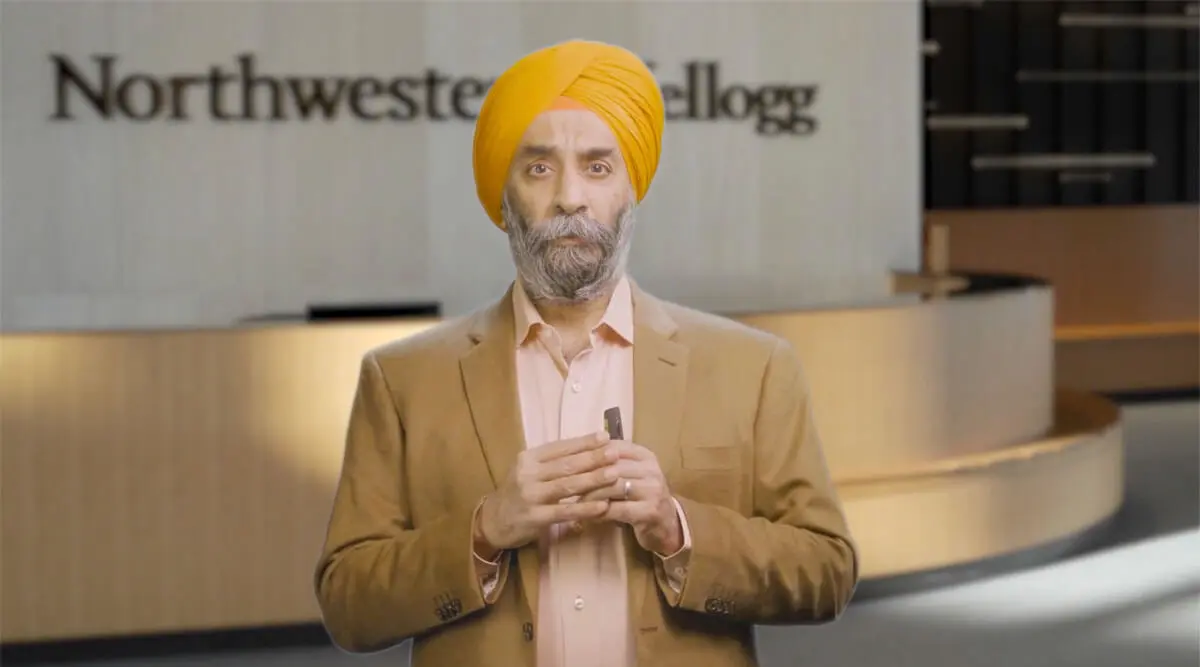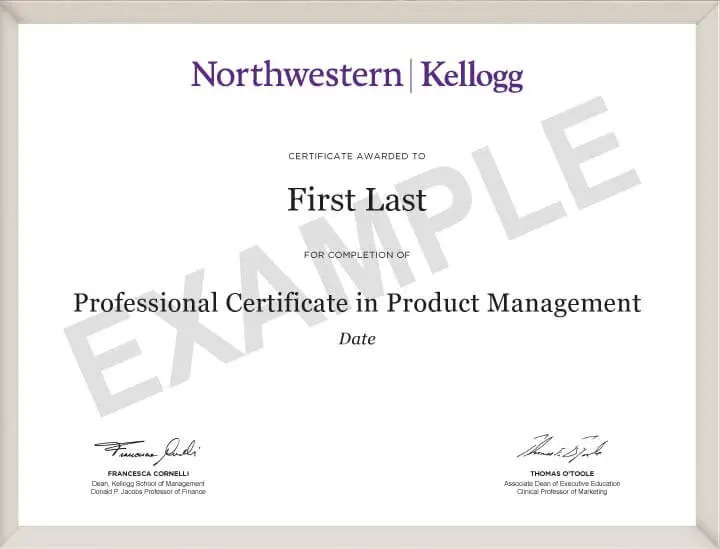Professional Certificate in Product Management
Program Overview
Product management has evolved rapidly over the last few years, as organizations have responded to pandemic-driven shifts by expanding their platform-based and digital product offerings. That evolution has led to an increased demand for skillful product managers across all industries, and global powerhouses such as Google, Tesla, Adobe, Salesforce, Apple and Meta are focused on hiring them.
This intensified emphasis on product management is the reason why the role itself is growing, with many product managers becoming direct owners of profit and loss (P&L) in their organizations. But all of this transformation — within the industry and the role — requires highly skilled professionals to help lead the way.
The Professional Certificate in Product Management from Kellogg Executive Education harnesses the best practices, frameworks and hard and soft skills to enhance your success as a product manager. The program introduces new content that explores the integration of AI tools in product management processes, such as user research and prototyping, to prepare participants for the future of product innovation. Whether you are launching your product management career or looking to hone your skills at a multinational organization or a micro startup, this program will provide you with the hands-on skills needed to succeed in this high-growth field.
Faculty Insights
Get a firsthand look at how this program builds the skills to lead product strategy and innovation.

Who Is This Program For?
The Professional Certificate in Product Management from Kellogg Executive Education is for those who want to build on or formalize their training for product management roles. The certificate will give you a broad perspective of the role and will provide you with the skills that will help you stand out to employers. The program is ideal for:
Early career professionals with one to five years of experience as a product manager or in a product support role
Professionals making a lateral career move from an adjacent field including engineering, user experience (UX) and user interface (UI), marketing or sales
Key Takeaways
Master the end-to-end process of discovering, designing, developing, delivering and managing products.
Learn the strategic thinking and tactical implementation skills needed to become a professional product manager.
Gain experience in product management tools and methodologies, including project management, user interface (UI) and user experience (UX), wireframing and analytics.
Hone your communication, negotiation and influence skills to effectively manage people and relationships.
Apply frameworks and tools to develop a start-to-finish product marketing plan.
Program Topics
Explore the Potential of Generative AI
Embark on an insightful journey to understand and apply generative AI within product management. Through dedicated content, you'll grasp the limitations and potential of these technologies for real-world applications. Learn how to utilize AI models for innovative business use cases, integrate AI tools into existing platforms, and enhance your product strategies with cutting-edge technologies. By the end, you'll be equipped with the knowledge to navigate and lead in the dynamic AI-driven product landscape.
The program touches upon:
The application of AI-based sentiment analysis tools in customer feedback analysis.
The role of AI in user testing through AI-powered heatmapping and click tracking.
AI-assisted wireframing and design tools to enhance rapid prototyping efforts.
The influence of AI and ML on product roadmaps and strategic OKRs.
The ethical considerations and biases in AI models relevant to product planning.
UI/UX Design Tools: From Sketches to Smart Solutions – exploring AI-specific tools and recommendations.
AI and the Portfolio Review Process – utilizing AI for product portfolio management.
Pathway to Becoming an Executive Scholar
Participants who successfully complete the Professional Certificate in Product Management will accrue points towards becoming an esteemed Kellogg Executive Scholar; a unique credential that provides you the opportunity to customize your pathway to achieve your professional development goals.
Kellogg’s expansive program offerings allow you to build a variety of competencies that focus on practical application. More than about learning to lead, the path to becoming an Executive Scholar is about leading through learning.
Program Faculty

Associate Dean for Digital Innovation, McCormick Foundation Chair of Technology, Clinical Professor of Marketing, Director of the Center for Research in Technology & Innovation
Professor Mohanbir Sawhney is a globally recognized scholar, teacher, consultant and speaker in business innovation, modern marketing and enterprise analytics. He has written ...
Instructors

Product Manager, Palo Alto Networks
With over 12 years of experience in product management, Steven Benario has worked with a broad range of organizations, including Microsoft, AOL, Pivotal Labs, Tenable, Electro...

UX/UI Design Lead, IDEO
Tamara Sanderson has lived as an expat for nearly nine years and visited 70 countries, all while working at Google, Automattic and Oliver Wyman. She brings the same explorer m...

Product Strategy Leader
Tami Reiss specializes in B2B SaaS and has over 15 years in helping startups, established enterprise organizations and community profit organizations define their product stra...








Career Preparation and Guidance
This program will guide your career path in product management by helping you craft your elevator pitch and sharpen your interview skills. These services are provided by Emeritus, our learning collaborator for this program. The support team includes program leaders and success coaches who will help you reach your learning goals and guide you through your job search. The primary goal is to help you develop the skills needed for a career in the product management field. However, job placement is not guaranteed.
Career preparation elements of this program include:
Crafting your elevator pitch
Optimizing your LinkedIn profile
Writing resumes and cover letters
Navigating your job search
Learning interview tips and preparation
Negotiating salary
Career exercises focused on launching a career as a product management professional include:
Job search and interviewing for product management positions
Building your personal brand and promoting your skills
Communicating product management concepts through a capstone project
Program Leaders
Our Learning Facilitators are industry experts who bring their insights to the course experience through live office hour sessions and personalized support.

Josh Quint has worked internationally and led teams of product managers in the construction and plumbing industries with a servant leadership approach. His global experience h...

Rafael Balbi, Jr. is a product leader with 10 years of experience building world-class products for millions of users. At Vimeo, the world's leading video platform for organiz...

With over 10 years of experience in product management and adjacent roles, Schmunk is an experienced product leader passionate about problem solving, organizing teams, systema...
*This is a sample of our program leaders, that may change for upcoming cohorts.

Certificate
Upon successful completion of the program, Kellogg Executive Education grants a verified digital certificate of completion to participants.
After successful completion of the program, your verified digital certificate will be emailed to you in the name you used when registering for the program. All certificate images are for illustrative purposes only and may be subject to change at the discretion of Kellogg Executive Education.
Note: This online certificate program does not grant academic credit or a degree from Kellogg School of Management.
FAQs
Financing Options
We offer several options to help you afford tuition for the Professional Certificate in Product Management Program.
Available opportunities to lower tuition fees include:
Referrals – You and a colleague can each receive USD 695 off your tuition when you enroll together. Refer now
Group enrollments – A discount of up to 20% is available for group enrollments. For more information, email. group-enrollments@emeritus.org
US Residents (Deferred payment option available)
Sallie Mae*
Fixed repayment, interest-only repayment, and deferred payment options available. Click here to learn more *At the time of loan application, please select ‘Undergraduate students’ when prompted.
Climb Credit
Immediate repayment, interest-only repayment, and deferred payment options available. Click here to know more
Flexible Payment Options For All
Flexible Payment Options – Monthly payments as low as USD 1,494. Choose to pay in two, three, or six monthly installments for higher flexibility Click here to learn more
You can opt for any one of the financing options to cover up to the full cost of the program tuition. If you are considering financing your program through one of our partners, the enrollment process can only be completed with the assistance of your program advisor.
Please note that loan applications should be submitted no later than four business days prior to the enrollment deadline due to processing time.
Didn't find what you were looking for? Write to us at learner.success@emeritus.org or Schedule a call with one of our Program Advisors or call us at +1 315 658 3754 (US) / +44 114 697 4559 (UK) / +65 3138 6835 (SG)
Early registrations are encouraged. Seats fill up quickly!
Flexible payment options available.
Starts On

